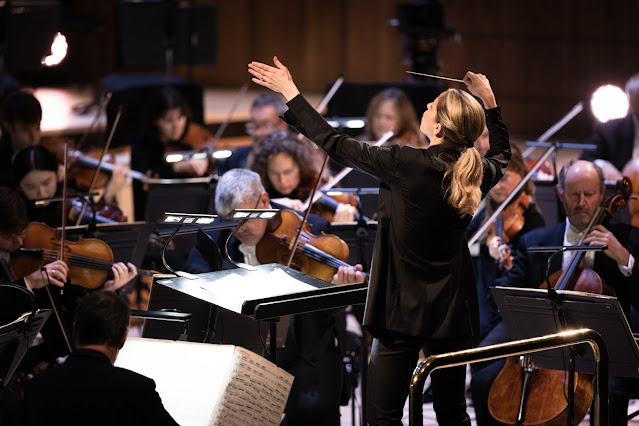 |
| London Philharmonic Orchestra, Karina Canellakis at Royal Festival Hall (photo Benjamin Ealovega) |
Boulanger, Wagner, Scriabin; London Philharmonic Orchestra, Karina Canellakis; Royal Festival Hall
Reviewed by Robert Hugill on 22 January 2022 Star rating: (★★★★½)
A short but intense programme that ended with a performance of Scriabin's outrageous outpouring that drew transparent textures and emotional strength from the orchestra
Under the title Poems of Ecstasy the London Philharmonic Orchestra and their principal guest conductor Karina Canellakis planned a programme at the Royal Festival Hall on Saturday 22 January 2022 that moved from Wagner's Prelude & Liebestod (from Tristan und Isolde) to three late Romantic works that took Wagner's ideas and ran with them, in somewhat different directions, Ravel's Concerto for the Left Hand, Lili Boulanger's D'un soir triste and Scriabin's Poem of Ecstasy (Symphony No. 4). In the event, pianist Cedric Tiberghian was ill and could not be replaced so the Ravel concerto was dropped from the programme. I know that we should not measure music-making by the yard, but this very much felt like a failure of imagination, leaving us with a programme of two short halves. In the event the performance of Scriabin's outrageous orchestral outpouring was so terrific that the evening was remarkably satisfying.
The revised concert programme began with Lili Boulanger. Her piece is late, written 1918 (the year of her death) and it exists in three different versions. In orchestral guise there was there was rich sonority and luscious harmony, but there was refinement too. There were intense moments and evocative moments, a real late romantic melange, yet throughout a refined sensibility with Canellakis drawing a fluid transparency form the large orchestra.
We began Wagner's Prelude & Liebestod with Canellakis conducting the opening in a clear six (though I remember Sir Roger Norrington talking about Wagner's speeds and the idea of conducting the prelude in a slow two). What was noticeable was the way Canellakis drew remarkable clarity of texture from the orchestra, again with great refinement. There was a lovely long line to the cello melody, and though the speed was not fast there was a slow build. The Liebestod had moments where Canellakis fined things right down, and the music kept a sense of onward flow with never a moment of stasis. Even in the bigger moments there was a lovely feeling of orchestral detail. Canellakis kept firm control, this music was never in danger of losing its head, though the forward momentum was inexorable. Overall this felt more like the prelude to something rather than the ultimate end.
After the interval we had Scriabin's Poem of Ecstasy. More a symphonic poem than symphony, it was written between 1905 and 1908 when the composer was heavily involved in the Theosophical Society. Scriabin's long poem, written to accompany the work, tracks the ascent of a spirit into consciousness and the music has a sense of timelessness and suspended animation because of his rhythmic ambiguity and the whole-tone-based dominant harmonies derived from Scriabin's "mystic chord". The use of whole tones means that Scriabin wrote music that often has no clear tonal centre.
From the outset, that same feeling of French refinement came over in the performance as Canellakis drew out the details of all myriad fragments that Scriabin writes which coalesce into a whole. Whilst you could hear Scriabin's debt to Debussy (in 1907 Scriabin was involved in concerts in Paris put on by Diaghilev) there also seemed to be pre-echoes of Stravinsky (whose first orchestral successes would not happen till 1909), and moments that prefigured the Ravel of Daphnis & Chloe. All remarkable stuff.
Whilst Canellakis had a fantastic ear for detail, when the climaxes came they were terrific, and with a strong sense of forward motion too, each climax moving on to the next. When we reach the moments with the tuned percussion, the overwhelming nature of the music was complemented by the remarkable clarity of texture that Canellakis achieved with her myriad players, that sense of French refinement in the orchestral writing. I must make a special mention of the trumpets (six of them) who made the important high trumpet writing seem effortless and beautiful.
Whilst Scriabin might have been Russian, this music made me think of Joris-Karl Huysmans's 1884 novel À rebours, all decadence and refinement.
Never miss out on future posts by following us
The blog is free, but I'd be delighted if you were to show your appreciation by buying me a coffee.
Elsewhere on this blog
- Winter Opera St Louis educates as it entertains - guest posting
- Pure joy: ECHO Rising Star recorder player Lucie Horsch & lutenist Thomas Dunford in music old & new - concert review
- Beyond Miss Julie: Joseph Phibbs on his opera Juliana setting Laurie Slade's updating of Strindberg - interview
- Opera scenes from the Young Artists of the National Opera Studio with the orchestra of English National Opera at Cadogan Hall - concert review
- Beauty and bleakness: Douglas Knehans' Cloud Ossuary from Brno Philharmonic Orchestra and Mikel Toms - record review
- The Art of Transformation: inspired by a Scottish Border ballad Alastair White's Woad is very much an opera for our times - record review
- A sense of ritual: Edward Jesson's Syllable, a work of complex musical theatre, is premiered by Trinity Laban Opera - opera review
- Still in cracking form: Verdi's Nabucco returns to Covent Garden - opera review
- The sense of eternity that can be found in the simple doing of something: Sven Helbig's Skills - interview
- In stunning control of his material: Gavin Higgins' Ekstasis from Piatti Quartet, Fidelio Trio, Thomas Gould, David Cohen, Sara Roberts - record review
- Personal Stories: Cevanne Horrocks-Hopayian's Welcome Party on NMIC - record review
- Panache, intensity and vivid story-telling from Claire Booth and Christopher Glynn in Modest Musorgsky: Unorthodox music at Wigmore Hall - concert review
- Home

No comments:
Post a Comment